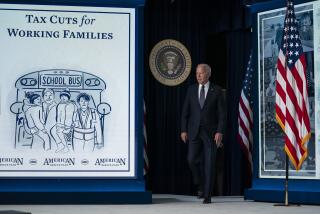Senate OKs Own Tax-Cut Measure
WASHINGTON â The Senate approved on Friday its own version of a bill providing $85 billion in net tax cuts over the next five years for families, students, home-sellers and investors, sending it to a House-Senate conference committee to find a compromise acceptable to President Clinton.
Passage of the Senate bill came on a bipartisan vote of 80 to 18 after the addition of last-minute amendments that would allow parents to use an âeducation savings accountâ to pay for private schools and would enable self-employed people to deduct the cost of health insurance.
The House passed a version of the bill on Thursday that contains essentially the same major elements, but with a few relatively minor differences. The conference committee, which will begin work when lawmakers return from their July 4 recess, will have to reconcile those disparities.
Panel members also are expected to negotiate with officials of the Clinton administration, which has served notice that it will seek some changes. The primary objection Clinton has voiced over the bill is a provision in the House version that would permit investors to âindexâ their capital gains--profits from the sale of stocks or other assets--to offset the impact of inflation. The Senate bill contains no such measure and House leaders have promised that they will be flexible.
The Treasury Department is expected Monday to unveil a list of the administrationâs demands.
Nevertheless, strategists predicted Friday that the lawmakers and the administration would probably reach agreement quickly, in time for Clinton to sign the bill in late July. He already has accepted the basic elements of both bills.
The tax-cut legislation--which constitutes the biggest tax reduction that Congress has enacted in 16 years--is a key component of the overall plan Clinton and Republican congressional leaders agreed to last month for balancing the budget by 2002.
The lopsided vote of approval in the Senate reflected an effort by leaders of both parties to court bipartisan support for the measure--in sharp contrast to the House, where Democrats essentially were cut out of the process of crafting the bill.
Sen. Pete V. Domenici (R-N.M.), chairman of the Senate Budget Committee, said after Fridayâs vote that Senate leaders had become aware that voters âwant to see us working togetherâ rather than engaged in partisan wrangling. âWe heard you and we acted,â he said.
Republicans sought to portray the passage of the bill as a sign that Washington has changed dramatically since the GOP took control of Congress in 1995 after having campaigned on a platform of reducing the size of the government.
âThe scene has changed,â said Sen. William V. Roth Jr. (R-Del.), chairman of the Senate Finance Committee. âRepublicans and Democrats alike are talking about balancing the budget and cutting taxes.â
Following the parameters set by the balanced-budget accord, the House and Senate measures would provide $135 billion in tax reductions between now and 2002, offset by $50 billion in new or extended taxes, primarily on airline tickets. The Senate bill also would raise taxes on cigarettes by about 20 cents a pack over the current 24-cent-a-pack level.
The bill passed by the Senate contains these major provisions, most of which parallel those in the House version:
* A tax credit for families of up to $500 for each child under 17, aimed primarily at couples whose combined income is less than $100,000. For children between 13 and 16, the credit would go only for funds that were placed in a special education savings account.
* A tax break for homeowners who sell their principal residences, enabling them to exempt the first $500,000 in profits from capital gains taxes. The cut would apply to houses sold after May 7, 1997.
* An education tax credit of up to 50% of the first $3,000 in tuition and books for the first two years of college or up to 75% of $2,000 for community colleges. Interest on student loans would be deductible.
* A cut in capital gains taxes, reducing the top rate to 20%, from 28% now, except for profits from real-estate sales, which would be taxed at a maximum 24%.
The bill also would provide special reductions in capital gains taxes for small businesses and venture capital.
* A reduction in inheritance taxes by increasing the exemption from federal estate taxes to $1 million by 2008--up from $600,000 now--and providing an additional $1-million exemption immediately for many family-owned farms and businesses.
* Liberalization of restrictions on individual retirement accounts by increasing the income limits and creating new kinds of accounts--open to all taxpayers, no matter their income. The interest a depositor earns could be withdrawn tax free to buy a first home or to retire.
The amendments the Senate approved on Friday were relatively modest.
One, by Sen. Paul Coverdell (R-Ga.), would expand the provision in the bill that allows parents to set up special savings accounts for college tuition to use the money for tuition at private elementary and secondary schools as well.
The Senate approved the plan by a vote of 58 to 42.
A second amendment, by Sen. Don Nickles (R-Okla.), would enable self-employed people to claim tax-deductions for the money that they spend on health insurance premiums, just as employers and workers in large corporations may do.
The provision was approved by a vote of 98-0.
The Senate defeated, 70-30, an effort by Sen. Edward M. Kennedy (D-Mass.) to channel an extra $12 billion into a federal health insurance program for children that lawmakers approved last week. The legislation approved earlier provided $24 billion.
(BEGIN TEXT OF INFOBOX / INFOGRAPHIC)
Where the Tax Cuts Are
Lawmakers will now attempt to merge the two tax-cut plans, then will vote again on a single plan to send to the president for final approval.
CHILD TAX CREDIT
House: $500 credit for children under age 17 for families who earn up to $110,000.
Senate: A $500-per-child tax credit for children under age 17, but with a twist: Parents with children age 13-16 must deposit the $500 credit into an education savings account, similar to an individual retirement account.
COLLEGE EXPENSES
House: Education tax relief features a $1,500 Hope scholarship tax credit and would provide for a $10,000 deduction for expenses paid through educational investment accounts.
Senate: Education tax relief, providing a Hope scholarship tax credit, similar to President Clintonâs proposal, for up to $1,500 for tuition and related expenses. The credit would be reduced by grants, scholarships or employer-provided benefits.
CAPITAL GAINS*
House: Capital gains tax rates on sales of stock and other assets would fall from a maximum 28% to 20% for individuals making more than $24,650 and couples making more than $41,200. Indexing provision aims to prevent taxation of capital gains attributable solely to inflation.
Senate: Capital gains provision similar to House bill, but without the indexing provision. Commercial real estate investors would be taxed at a maximum 24% rate on gains.
ESTATE TAXES
House: Estate taxes would be eased by raising the $600,000 exemption to $1 million by 2007.
Senate: The Senate bill would provide up to $2 million in relief from estate taxes for individuals with a small business by 2006.
IRAs
House: Individual retirement accounts would be expanded.
Senate: IRAs would be expanded to let spouses set up their own plans and make taxable contributions that can be withdrawn later, tax free.
TOBACCO*
House: None
Senate: A 20-cent-a-pack cigarette tax increase.
* Indicates where the greatest conflict exists
$500-Per-Child Tax Credit Worksheet
Married couple with two children and a $30,000 income:
1. Standard deduction: $6,900
2. Dependents (not including spouse): Two
3. Personal exemption for you $2,650
4. Personal exemption for spouse $2,650
5. Personal exemption for dependents $5,300
(line 2 multiplied by $2,650)
6. Total personal exemptions: $10,600
7. Total deductions and exemptions: $17,500
8. Taxable income (income less line 7): $12,500
9. Tax liability under current code (15% of line 8) $1,875
10. Child tax credit ($500 times number of children) $1,000
11. Tax due: $875
Bottom Line:
Family would see taxes cut by more than half.
Source: Associated Press, Times staff, Senate Republican Conference
More to Read
Get the L.A. Times Politics newsletter
Deeply reported insights into legislation, politics and policy from Sacramento, Washington and beyond. In your inbox three times per week.
You may occasionally receive promotional content from the Los Angeles Times.










